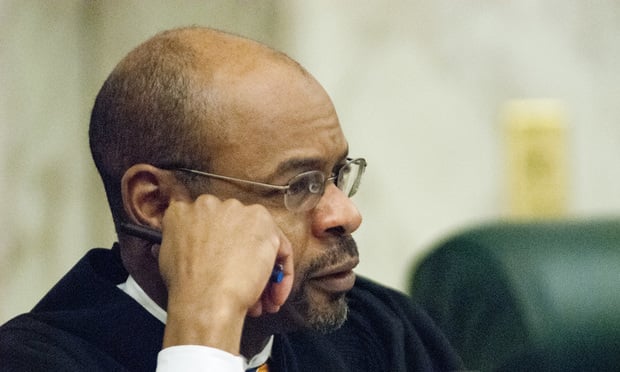Court Says Cell Companies Can Seek Sales Tax Overpayments
The decision removes a roadblock to $6 million in sales tax being refunded to cellphone customers.
April 16, 2018 at 01:28 PM
3 minute read

The Georgia Supreme Court on Monday, upending what it called an “illogical” decision by the state Department of Revenue, ruled that five AT&T subsidiaries can apply for a refund of sales tax overpayments without first sending money back to customers.
The decision removes a roadblock to $6 million in sales tax being refunded to cellphone customers. Presiding Justice Harold Melton said it was reasonable to allow the company to first find out if it can obtain the refund before paying the sums back to customers.
On the losing end of the decision is the Georgia Department of Revenue, defended by the Office of Attorney General Chris Carr. Carr declined to comment.
The winners are New Cingular Wireless, Chattanooga MSA, Georgia RSA and Northeastern Georgia RSA. Their local counsel is Bryan Vroon. Vroon referred an inquiry to AT&T spokesman Marty Richter.
” We're pleased with the ruling,” Richter said by email. “We don't stand to benefit from this lawsuit in any way. Any refunded taxes will be passed along to our Georgia customers, who initially paid the taxes.”
According to the court, the revenue department took five years to deny a request for a refund from the AT&T companies that had collected and paid sales tax for internet data services that were exempt. In the original denial, the department offered no reason, Melton said in a footnote on his first page. The AT&T subsidiaries sued. The department moved to dismiss the case for several reasons, one of which was its interpretation of a global settlement agreement to mean the companies would have to repay the tax collections to customers before applying for a refund from the state.
Melton said that position was unreasonable and made no sense.
“A simple hypothetical highlights the unfairness of the Department's interpretation,” Melton said. “Assume Dealer X collected $100 million in sales tax from customers and paid this amount to the Department erroneously. Later, Dealer X wished to seek a refund of these erroneously paid taxes. Dealer X would be required to refund $100 million to its customers just to initiate the process of seeking a refund from the Department. This would have to be done long before Dealer X knew whether the Department would approve any refund at all—an answer that the Department might not give for years.”
Even then, the hypothetical example continues, the company “would have to prepay $100 million to its customers to potentially be told by the Department that no refund was due at all. If the actual amount of the refund turned out to be less than $100 million, the Department would offer no real solution that would make Dealer X whole.”
Melton said the revenue department's position is “illogical, and creates a strong disincentive for dealers to seek refunds on behalf of customers,” which “undercuts the clear intent” of the law.
The law in question is OCGA § 48-2-35, which ensures that overpaid or illegally collected taxes are returned to taxpayers, Melton said.
The decision was unanimous but different from the usual vote. Justice Nels Peterson did not participate. Justice Britt Grant was disqualified. Both justices formerly served as solicitor general in the Office of Attorney General. Substituting for the missing justices were Atlantic Judicial Circuit Judge D. Jay Stewart and Southern Judicial Circuit Judge James Tunison. They concurred.
The case is Cingular v. Georgia Department of Revenue, No. S17G1256.
This content has been archived. It is available through our partners, LexisNexis® and Bloomberg Law.
To view this content, please continue to their sites.
Not a Lexis Subscriber?
Subscribe Now
Not a Bloomberg Law Subscriber?
Subscribe Now
NOT FOR REPRINT
© 2025 ALM Global, LLC, All Rights Reserved. Request academic re-use from www.copyright.com. All other uses, submit a request to [email protected]. For more information visit Asset & Logo Licensing.
You Might Like
View All

On The Move: Ex-Partner Returns to Lead Nelson Mullins Corporate Group, Burr & Forman Hires University GC as COO
5 minute read
Law Firm Sued for Telemarketing Calls to Customers on Do Not Call Registry

Evidence Explained: Prevailing Attorney Outlines Successful Defense in Inmate Death Case
Trending Stories
- 1New York-Based Skadden Team Joins White & Case Group in Mexico City for Citigroup Demerger
- 2No Two Wildfires Alike: Lawyers Take Different Legal Strategies in California
- 3Poop-Themed Dog Toy OK as Parody, but Still Tarnished Jack Daniel’s Brand, Court Says
- 4Meet the New President of NY's Association of Trial Court Jurists
- 5Lawyers' Phones Are Ringing: What Should Employers Do If ICE Raids Their Business?
Who Got The Work
J. Brugh Lower of Gibbons has entered an appearance for industrial equipment supplier Devco Corporation in a pending trademark infringement lawsuit. The suit, accusing the defendant of selling knock-off Graco products, was filed Dec. 18 in New Jersey District Court by Rivkin Radler on behalf of Graco Inc. and Graco Minnesota. The case, assigned to U.S. District Judge Zahid N. Quraishi, is 3:24-cv-11294, Graco Inc. et al v. Devco Corporation.
Who Got The Work
Rebecca Maller-Stein and Kent A. Yalowitz of Arnold & Porter Kaye Scholer have entered their appearances for Hanaco Venture Capital and its executives, Lior Prosor and David Frankel, in a pending securities lawsuit. The action, filed on Dec. 24 in New York Southern District Court by Zell, Aron & Co. on behalf of Goldeneye Advisors, accuses the defendants of negligently and fraudulently managing the plaintiff's $1 million investment. The case, assigned to U.S. District Judge Vernon S. Broderick, is 1:24-cv-09918, Goldeneye Advisors, LLC v. Hanaco Venture Capital, Ltd. et al.
Who Got The Work
Attorneys from A&O Shearman has stepped in as defense counsel for Toronto-Dominion Bank and other defendants in a pending securities class action. The suit, filed Dec. 11 in New York Southern District Court by Bleichmar Fonti & Auld, accuses the defendants of concealing the bank's 'pervasive' deficiencies in regards to its compliance with the Bank Secrecy Act and the quality of its anti-money laundering controls. The case, assigned to U.S. District Judge Arun Subramanian, is 1:24-cv-09445, Gonzalez v. The Toronto-Dominion Bank et al.
Who Got The Work
Crown Castle International, a Pennsylvania company providing shared communications infrastructure, has turned to Luke D. Wolf of Gordon Rees Scully Mansukhani to fend off a pending breach-of-contract lawsuit. The court action, filed Nov. 25 in Michigan Eastern District Court by Hooper Hathaway PC on behalf of The Town Residences LLC, accuses Crown Castle of failing to transfer approximately $30,000 in utility payments from T-Mobile in breach of a roof-top lease and assignment agreement. The case, assigned to U.S. District Judge Susan K. Declercq, is 2:24-cv-13131, The Town Residences LLC v. T-Mobile US, Inc. et al.
Who Got The Work
Wilfred P. Coronato and Daniel M. Schwartz of McCarter & English have stepped in as defense counsel to Electrolux Home Products Inc. in a pending product liability lawsuit. The court action, filed Nov. 26 in New York Eastern District Court by Poulos Lopiccolo PC and Nagel Rice LLP on behalf of David Stern, alleges that the defendant's refrigerators’ drawers and shelving repeatedly break and fall apart within months after purchase. The case, assigned to U.S. District Judge Joan M. Azrack, is 2:24-cv-08204, Stern v. Electrolux Home Products, Inc.
Featured Firms
Law Offices of Gary Martin Hays & Associates, P.C.
(470) 294-1674
Law Offices of Mark E. Salomone
(857) 444-6468
Smith & Hassler
(713) 739-1250






